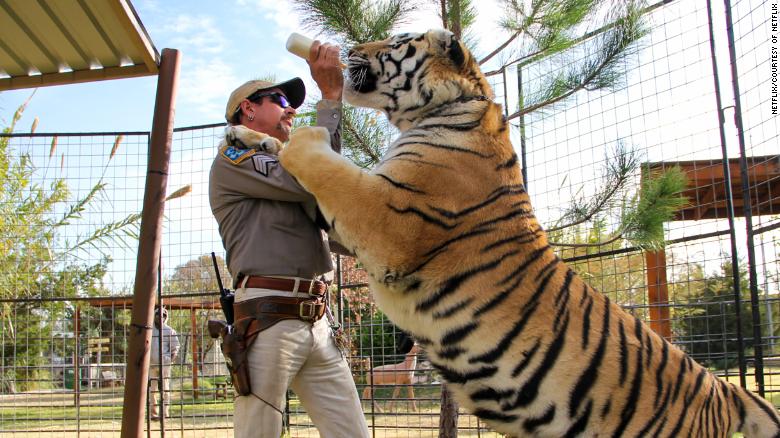“Tiger King” exposes the dark world of exotic animal breeding
Joe Exotic feeds one of his tigers in an episode of “Tiger King.” As the series progresses, viewers learn that many of these zookeepers are bigger money lovers than animal lovers.
May 7, 2020
When in quarantine, life can feel a little boring. With plenty of free time on our hands, we may feel as though we are lacking some excitement in our lives. If you have been craving drama, jungle animals, and mullets, “Tiger King” may be exactly what you need.
The hit Netflix docuseries follows Oklahoma’s G. W. Exotic Animal Park owner Joe Exotic through the ups and downs of his zoo experiences. The seven-episode series focuses on people who collect and breed tigers in the U.S., while including plenty of feuds, rivalries, and heartbreak. What starts out as a seemingly fun and humorous show quickly turns into a dark story that remains unresolved.
The program’s driving force, Joe Exotic, appears to be a fun, quirky guy with a simple desire to care for big cats. As the series progresses, the deterioration of Joe Exotic’s ethical standards land him in serious trouble with the government and his business partners. During his fight for wealth and fame, he puts the tigers on the back-burner. With murder-for-hire plot allegations and animal abuse charges under his belt, the so-called “Tiger King” is arguably the last person to look to as an animal activist.
Many of his competitors within the world of exotic animals know him very well, and their interviews throughout the series make them just as captivating of characters as Joe Exotic himself. As each one shares their story, a whole new subculture of American people is revealed, and we eventually see that some of the biggest names in the industry are most likely motivated by all the wrong reasons. While at first glance they come across as true animal lovers, we quickly learn that rapidly breeding large cats is a quick way to turn a profit.
Through all of the intense feuds and drama within this wild niche, the tigers and other animals seem to be pushed aside. Despite the fame and attention particular people from the show are receiving, nothing benefits these animals that live miserable lives in cages instead of their natural habitats.
The series ends on a seemingly unsatisfying note, with none of the drama being resolved and with even more shocking details uncovered. The ending, however, brings to light the severity of encouraging this culture. According to the series, an estimated 5,000-10,000 tigers live in U.S. captivity, while fewer than 4,00 remain in the wild. Shifting the spotlight from the fame-driven, corrupt stars to the animals they harm has certainly brought awareness to the public.
Be sure to watch this series for the unique drama and serious issues that it brings to light. “Tiger King” is entertainment in its finest form.






